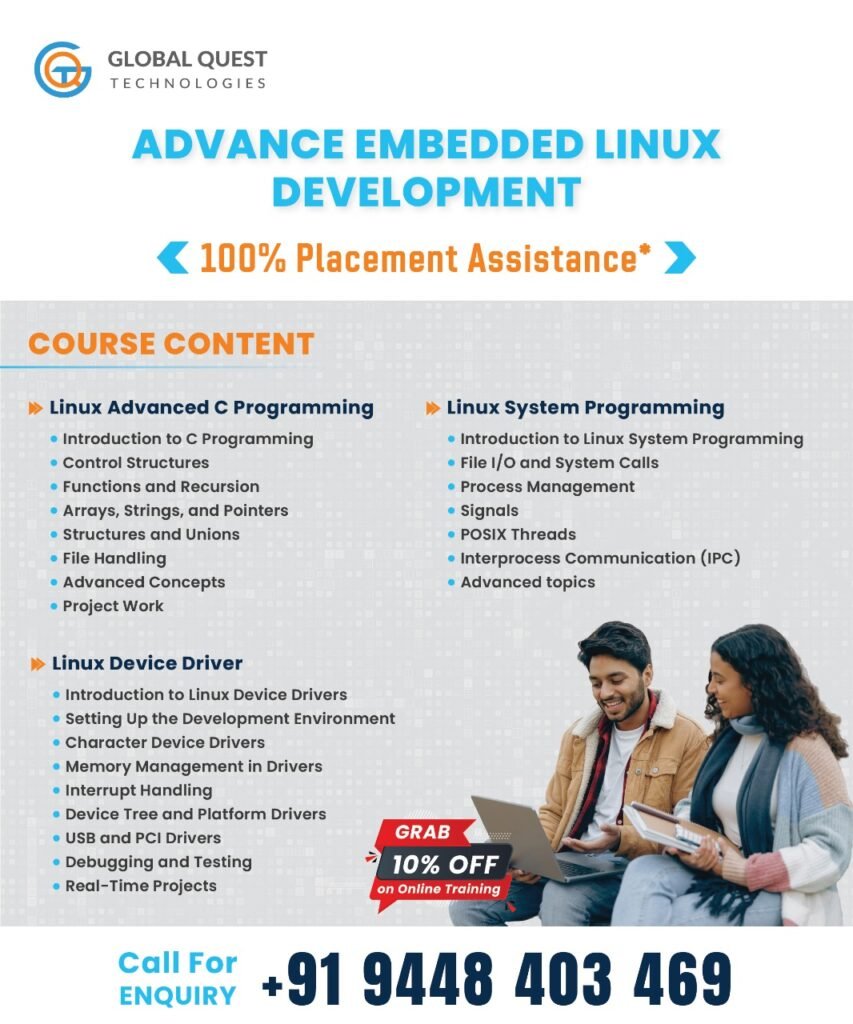
We go over all the prerequisites needed to acquire a fantastic job, from the ground up.
Providing complete assistance with the preparation to crack the interviews
We are assisting in finding better and more relevant job openings.
Through guidance ensures the students gain the best out of the course.
Gain industry-relevant expertise with practical, project-based learning.Learn from experienced trainers with real-world embedded systems knowledge.Get career-focused guidance to boost opportunities in embedded development.
Have total 9 Years of experience in Linux Device Drivers development as well as debugging, RDKM security and Yocto build system. 2 years of experience in Linux Device Drivers development. 2.5 years of experience Android kernel debugging. 4.4 years of experience in STB (SET-UP BOX) domain. RDKM security, RDKV in yocto build environment.
Real-world application using Function, Arrays, structures and pointers
Hands-on: Multithreaded file downloader.
Hands-on: Implement a driver that maps kernel memory to user space.
Hands-on: Simulate interrupt handling using GPIO or timers.
Hands-on: Write a platform driver for a virtual device using Device Tree.
Hands-on: Write a USB driver for a simple HID device.
Hands-on: Debug a faulty driver and fix memory leaks.
Project: Hands-on Build a complete driver for a temperature sensor using I2C.
Learn cloud computing, storage, networking, and security from basics to advanced.
Work on real-world scenarios to gain practical experience in AWS services.
Get trained by industry professionals with in-depth cloud expertise.
Prepare for AWS certification and boost your career in cloud computing

Anyone with basic knowledge of Linux or programming can join.
You’ll learn kernel customization, device drivers, system programming, and embedded Linux applications.
Yes, it covers concepts step by step, but prior Linux knowledge is helpful.
Yes, the course includes hands-on projects to apply concepts practically.all projects are designed to match real-world embedded system scenarios.
You can work as an Embedded Linux Developer, System Engineer, or IoT Specialist.
EXCELLENTTrustindex verifies that the original source of the review is Google. I had a really good learning experience at Global Quest Technologies. The Core Java and MySQL training was very practical and easy to follow. The trainers, especially Raghu Sir, were supportive and explained everything clearly. I feel much more confident.Posted onTrustindex verifies that the original source of the review is Google. I recently completed the MySQL training at Global Quest Technologies under the guidance of Raghu Sir, and it was an excellent learning experience. The course was very well-structured, starting from fundamentals and gradually moving into advanced topics.He explained every concept with great clarity and real-time examples, which made it easy to understand even the complex parts of SQL. I am very thankful to Raghu Sir and Global Quest Technologies for their excellent training and support. I would definitely recommend this institute to anyone who wants to build strong MySQL skills. And also I have currently completed core java from global quest technologies as java full stack intern under the mentoring of Raghu sir.The classes are absolutely worth and he has coverd all the important core concepts in java.I would recommend the classes to all.Such a good class.Posted onTrustindex verifies that the original source of the review is Google. It is a great Experience to coming here and learning the technology currently i have completed Core Java by Raghu sir, all the concepts is clear.. thank you so much GQTPosted onTrustindex verifies that the original source of the review is Google. Global quest technologies is providing the best trainer now i have completed my corejava classesPosted onTrustindex verifies that the original source of the review is Google. I had privilege of learning MySQL under the guidance of Raghu sir, and it has been excellent experience. Raghu sir is not only an expert in SQL but also a great mentor, His classes are well paced, engaging, and perfectly suited for both beginners and advanced learners.Posted onTrustindex verifies that the original source of the review is Google. Trained by professional corporate trainer Raghu sir. Gained practical experience in Java and MYSQL.Posted onTrustindex verifies that the original source of the review is Google. I am so thankful to GQT (Global Quest Technologies) for providing excellence knowledge and giving practical experience through out the training . Thank you to GQTPosted onTrustindex verifies that the original source of the review is Google. It is a great expreince to coming here and learning the technology currently i have completed SQL by Raghu sir, all the concet is cleare... thank you so much GQTPosted onTrustindex verifies that the original source of the review is Google. Raghu Sir’s SQL sessions were not just about queries and commands, but about truly understanding how databases think. His way of connecting real-life scenarios with SQL concepts made the subject come alive. What I liked most was his patience in clearing doubts and the way he built confidence in approaching complex problems step by step. It was more than a class – it was an experience that strengthened my foundation in SQL. Honestly i liked it. Thank You sir [Indra]Posted onTrustindex verifies that the original source of the review is Google. It was an good experience being in this soft skill class where i can learn more things like how to communicate, manage the things . Where i learned how to perform in group discussion, interview and built my confident. It was an amazing class and i am very glad and thankful for being in sir class. The MYSQL class which gives a good experience on how to solve queries and learn from it , the topic which was covered like ddl , dml , dql, clause, function, transaction, er diagarm ,view ,stored procedure, triggers , variables .Verified by TrustindexTrustindex verified badge is the Universal Symbol of Trust. Only the greatest companies can get the verified badge who has a review score above 4.5, based on customer reviews over the past 12 months. Read more
WhatsApp us